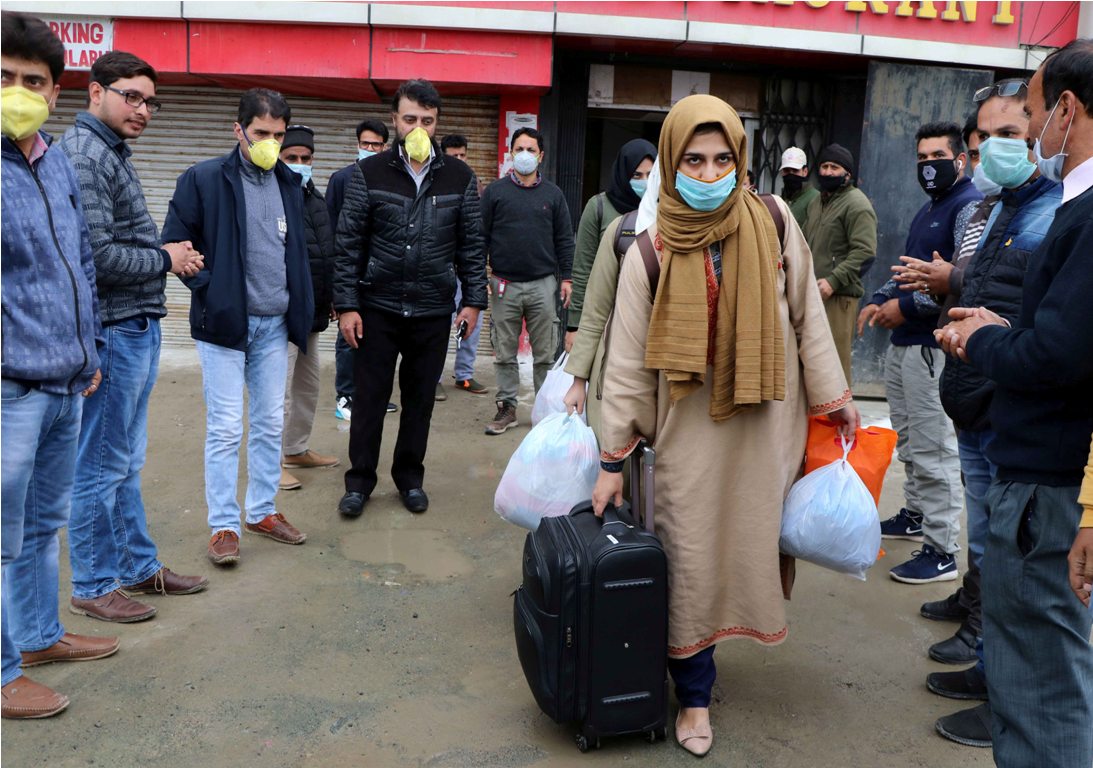by Javaid Iqbal
I recently came across a newspaper article where a family man was asked by his local milkman not to visit him. The reason given was that this person had returned from overseas. Although it had been a month since this person came to Srinagar—and had completed the required quarantine period as directed by health authorities—the milkman did not care and refused services.

Many such reports continue to be published about people who have allegedly hidden their travel history or arrived in Kashmir by road to avoid the screening and mandatory quarantine period. While this behaviour may understandably confuse people—since such practices can lead to unmitigated harm—there is a reason that we must fight this urge of blaming people. It is stigma.
The stigma—especially social stigma— is trailing those suspected of Coronavirus infection (or Covid-19, the ensuing disease). This has been observed worldwide, and now it has arrived in Kashmir. The community in Kashmir should understand that such stigma can be a barrier to health-seeking behaviour, and a cause of ultimate social suffering. This manifests through avoidance of regular people because there is a fear of acquiring the infection. It is driven by gossip and leads to verbal abuse. This is why a person—deemed by society as a “suspect” without clinical confirmation—could find themselves unable to seek help, fearing a loss in social status, marital problems, or hurtful response from the community. This also affects the mental health and wellbeing of people who may otherwise be non-infectious.
Not surprisingly, such stigma affects women more—because we all have observed how there can be insensitive people in our communities that ask the most insensitive questions at the most inappropriate time. These issues could lead to significant problems, ranging from marriage to professional future. This is why the issue around stigmatization of Covid-19 in Kashmir needs to be recognized and examined.
Kashmir, unfortunately, is already home to some of the worst forms of stigmas. For those affected, discrimination at workplaces and schools, social isolation, neglect, and abandonment are a routine experience. For those suspected of Covid-19, social stigma sticks, with phrases as “that person has coronavirus” thrown around. What people may underestimate is that such labels can cause problems long after the disease has been managed. Clinically, this kind of social stigma can also delay diagnosis (with people worried about being labelled) and prevent access to life-saving treatment. Such labels are more infectious in a close-knit community such as Kashmir.
As a global developmental researcher, I have studied and reported on the devastation that such stigma can cause. It leads to people being shunned and isolated, and discriminated against in receiving healthcare, at work, and at school. Stigma shreds individuals of their self-respect and aggravates the already difficult conditions among the most vulnerable. It can have major impacts on mental health, such as depression and suicide. This is more important in a community like Kashmir—where almost half of the population is reportedly suffering from severe mental health.
It is always counterproductive and unfair to blame individuals. Stigma in health facilities undermines diagnosis, treatment, and successful health outcomes. Addressing stigma is essential to providing quality healthcare and achieving optimal health. Communities should not cause more suffering—even for those who may be inflicted by this virus. Worryingly, such stigma can prevent people from seeking the definitive help they need. This is especially true for the vulnerable communities in Kashmir—those who are socially and financially constrained—who already carry heavier burdens of discrimination. Such stigma is an unacceptable addition to their burdens and pains.
Collective empathy is the only approach to fight this stigma—and that requires proactive education for ourselves and people we interact with. We should spend some time—and these days we have more of that, given the social distancing guidelines—to understand how Covid-19 spreads, and importantly, what measures we can take to mitigate its impact.
Since intuition—and these days, the constant barrage of “breaking news”—are some of the reasons why we have heightened our focus on this disease, we need to be more mindful of how our own biases may be working against us. We may be reacting to the fear that these alarming statistics induces. However, stigma and fear can never overcome the disease—they can only aggravate and exacerbate it.
We must rely on credible information and heed the advice of experts on the matter. This can be done through following information from sources that are globally recognized—especially sources on social media. We should also cross-check information before we believe it or share it—Google has made this easier than ever. This is critical—because the onset of Covid-19 was late in Kashmir, and the numbers are expected to increase.

We should also raise awareness about the infection, without engendering fear. We must only share accurate information on how the virus spreads, and what we should be doing. We can do this by minimizing the “opinions” and “posts” by people who are not scientifically trained in medicine, public health, or epidemiology. We can easily find information from sources such as WHO, CDC, and other global organizations—if we want to share information for the benefit of our online communities.
It is hard—cognitively—to understand the significance of the moment we are in. Being in the midst of a global health crisis, it may be understandably difficult to focus on people who are not our family or friends. But this is also why we must act more proactively—history is filled with examples where unimaginable damage was caused by ordinary citizens, who thought they were acting in good faith. We must ensure we are not among those who history will ultimately condemn. We need to be kind and understanding to each other—especially now. Given that we are living in a period of deep uncertainty and untreatable fear, we will find comfort only in each other.
(The author is a Global Fellow at Heller School of Social Policy and Management, Brandeis University.)















